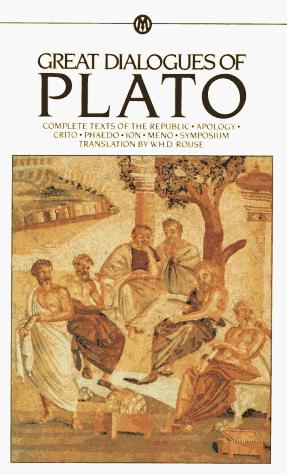lingua English
Great dialogues of Plato
Meno (; Greek: Μένων, Ménōn) is a Socratic dialogue by Plato. Meno begins the dialogue by asking Socrates whether virtue is taught, acquired by practice, or comes by nature. In order to determine whether virtue is teachable or not, Socrates tells Meno that they first need to determine what virtue is. When the characters speak of virtue, or rather arete, they refer to virtue in general, rather than particular virtues, such as justice or temperance. The first part of the work showcases Socratic dialectical style; Meno, unable to adequately define virtue, is reduced to confusion or aporia. Socrates suggests that they seek an adequate definition for virtue together. In response, Meno suggests that it is impossible to seek what one does not know, because one will be unable to determine whether one has found it.Socrates challenges Meno's argument, often called "Meno's Paradox" or the "Learner's Paradox," by introducing the theory …
Meno (; Greek: Μένων, Ménōn) is a Socratic dialogue by Plato. Meno begins the dialogue by asking Socrates whether virtue is taught, acquired by practice, or comes by nature. In order to determine whether virtue is teachable or not, Socrates tells Meno that they first need to determine what virtue is. When the characters speak of virtue, or rather arete, they refer to virtue in general, rather than particular virtues, such as justice or temperance. The first part of the work showcases Socratic dialectical style; Meno, unable to adequately define virtue, is reduced to confusion or aporia. Socrates suggests that they seek an adequate definition for virtue together. In response, Meno suggests that it is impossible to seek what one does not know, because one will be unable to determine whether one has found it.Socrates challenges Meno's argument, often called "Meno's Paradox" or the "Learner's Paradox," by introducing the theory of knowledge as recollection (anamnesis). As presented in the dialogue, the theory proposes that souls are immortal and know all things in a disembodied state; learning in the embodied is actually a process of recollecting that which the soul knew before it came into a body. Socrates demonstrates recollection in action by posing a mathematical puzzle to one of Meno's slaves. Subsequently, Socrates and Meno return to the question of whether virtue is teachable, employing the method of hypothesis. Near the end of the dialogue, Meno poses another famous puzzle, called "The Meno Problem" or "The Value Problem for Knowledge," which questions why knowledge is valued more highly than true belief. In response, Socrates provides a famous and somewhat enigmatic distinction between knowledge and true belief.
